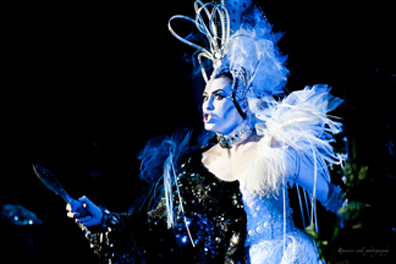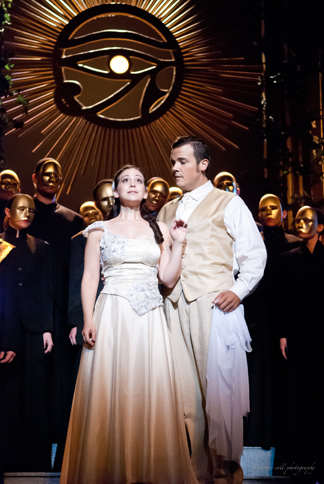Share |
Music: Opera on the Rise in Virginia
By Mary Burruss
ART TIMES Online August 2012
|
In one season under Michelle Krisel’s direction, Ash Lawn Opera is attracting top emerging talent to perform in its summer festival season. Artists who have worked at the Met, La Scala, Frankfurt Opera, San Francisco Opera, and New York City Opera are camping out with host families in Charlottesville, Virginia just to be a part of this rising company, which is thriving in a time when many arts organizations are faltering. But Ash Lawn Opera’s story is just a piece of the growing opera scene in Virginia.
Since 2009, 11 opera companies have shut down across the nation (including three thus far this year) compared to a total of three companies closing in the two years prior — a seeming epidemic. Even long standing organizations that had persisted through other economic slumps, including the Baltimore and Connecticut Operas (founded in 1950 and 1942 respectively), succumbed to dwindling donations and falling ticket sales. Regardless of the reasons those 11 failed, opera companies in Virginia seem to be blossoming. Three out of the eight opera companies in The Old Dominion have opened since 2007, including The Castleton Festival started in 2009 by world famous conductor, Lorin Maazel.
The three largest professional companies in Virginia — Ash Lawn Opera, Lyric Opera Virginia and Virginia Opera — are all showing signs of growth. Ash Lawn Opera is expanding its season to include a production of “Amahl and the Night Visitors” this winter. Virginia Opera is recovering after a public relations debacle it experienced over the dismissal of Artistic Director, Peter Mark and has added a show to its season. Lyric Opera of Virginia, which is Mark’s new venture, survived its inaugural year and is in the planning stages for expansion. The Castleton Festival added 250 seats to its concert hall reaping an overall increased attendance of about 30% this season. Even a new training facility for would be opera singers, Urban Arias, opened this year in Arlington demonstrating a growing need. How is opera gaining ground as a performing art in Virginia when companies elsewhere are struggling? The answer lies in some smart business strategies.
Programming is a key element of success according to Ash Lawn Opera General Director, Michelle Krisel. “We take great care in selecting repertoire people want to see,” she says. Ash Lawn Opera currently presents a standard opera, a musical and a shortened version of the selected standard each season. The newly added winter opera will “...reach an audience who is out of town in the summer,” says Krisel. Though, at this writing they were just beginning their season, Ash Lawn Opera ticket sales have increased a whopping 56% from last year.
|
Lyric Opera Virginia’s programming formula is almost identical to Ash Lawn Opera’s, with the exception of the new winter addition. Having a musical in the season has long been a formula for success for European opera companies while considered uncouth by their American cousins. But commercial success is beginning to trump Yankee snobbery and musical theater appears to be a good lure for second tier ticket buyers. Joseph Walsh, General Director of Virginia Opera explains, “People come to the musicals and like them then buy tickets to the operas. We sold more tickets to our Jewel Box version of Carmen (which followed the musical production) than we did to our full length La Traviata our first opera of the season” A Jewel Box format is a 90 minute presentation of highlights from an opera designed to attract first time opera goers and families. “People got very excited about the Jewel Box production, particularly those who had never been to an opera before,” says Walsh.
Virginia Opera is a bit more ambitious with its programming offerings. “Our audiences have a vast range of tastes from those just beginning to appreciate opera to long time fans who need more than standard fare. We aim to keep them all happy,” says Virginia Opera’s Marketing Director, Anna Russel. Virginia Opera is now committed to having a freshly staged company premier for its first show every season and staging a new American opera each season as well adding a dash of avant garde and adventure to their programming. The more varied program mix is having significant success. “Subscription ticket sales are currently 24% ahead of same time last year,” says Virginia Opera’s President and CEO, Russell P. Allen, “a good indication that programming strategies implemented last season are working.”
Programming goes a long way in increasing ticket sales but other strategies are needed to fill in budgetary gaps. “For most companies, ticket sales provide 40% of their budget; our ticket sales only cover one-third of our budget because our ticket prices are low and we only do 10 performances,” explains Krisel. “We purposefully have this ticket sales to budget ratio in order to keep the shows accessible to the public,” says Krisel. Ash Lawn Opera tickets range from $11 to $54. For comparison, bigger houses like The Metropolitan Opera of New York earn 50% of their budgets through ticket sales as a result of offering many performances and charging high prices per ticket ($37 - $480). For Ash Lawn Opera, sticking to the budget and thinking outside the box are keys to success. “Our budget is so lean there is no room for someone to sneeze because we couldn’t afford to buy a Kleenex,” laughs Krisel. Krisel makes all sorts of deals like borrowing band uniforms from a local high school for this season’s production of The Music Man to facilitate the high quality production values she demands for her audiences. Lyric Opera Virginia is re-assessing its budget constraints to be a bit leaner and meaner in its second season to accommodate higher artistic goals. The schedule is shrinking to 12 performances form 21 with tours to fewer cities. “We found that after our first year we needed to make some adjustments, which is common for new companies,” says Walsh.
Aggressive outreach seems to be the most important factor for growth in the current economy. Opera on the James, a smaller company located in Lynchburg, increased its educational outreach program from 12 to 30 performances in one year. Opera on the James President, David Neumeyer explains, “We have really been focusing on a new young artists program and public awareness.” Ash Lawn Opera instigated a pre-broadcast program for local Metropolitan Opera HD performance ticket holders to capture an audience already interested in opera but not attending Ash Lawn Opera performances en mass. But one of Ash Lawn’s most effective strategies is to include children in productions. Offering children opportunities to perform in productions attracts families who will hopefully turn into patrons and long-term donors. This year Ash Lawn Opera there are 44 local children appearing in Ash Lawn Opera’s summer season. “Having kids in the shows means that the parents and grandparents and friends all buy tickets to see them while encouraging a love for opera in the kids themselves.” Opera Roanoke has increased their ticket sales by roughly 20% in the past year by focusing marketing efforts on young professionals according to Marketing Director, Theresa Carpentieri. “We will be able to put on two full scale productions this year, which we are very proud of,” she reports as a sign of prosperity.
Virginia Opera, which delivers 32 performances of four operas per season has a $6 million budget to generate with only 1/3 of the budget raised through ticket sales. Allen and Russell upgraded and increased communications with existing and potential subscribers and Board members including re-instating telemarketing as their means for encouraging growth. “Adding new marketing strategies for digital promotion and better targeted mail campaign have helped significantly in subscription sales efforts,” says Allen. “The Opera experienced early success with both its 2012-13 Challenge Campaign and Annual Fund Campaign and also increased contributions from Board and non-Board alike have been forthcoming.” The results: four added employees and higher subscription sales. “Four-opera subscribers renewed at an amazingly high renewal rate of 86%,” Allen beams. “Similarly, regular Annual Fund contributions are ahead of the same time last year by almost 20%. These signs are all good.” In terms of reaching the next generation of opera lovers, Virginia Opera has extended its education program from last year’s 97 schools to 140 schools this year.
Lyric Opera Virginia has a $2,000,000.00 budget of which 45% is raised through ticket sales. As a rookie company who needs to build a brand, they used extensive community outreach to earn their impressive1500 subscribers their first season. “We had as many as five education and cultural events in each location during the run of each show,” says Walsh, proving the effectiveness of “getting out there”.
Through the use of programming, good fiscal management and extensive and well targeted outreach, Virginia opera companies seem to be debunking the perception of loftiness to a much needed second tier ticket buyer giving them means to prosper despite economic threats. By attracting new support for the operatic medium business — and arias — continue to boom across the state.
(Mary Burruss is an Arts & Culture journalist and blogger in Central Virginia who fell in love with opera when she saw Placido Domingo sing at the Washington National Opera Company.)


